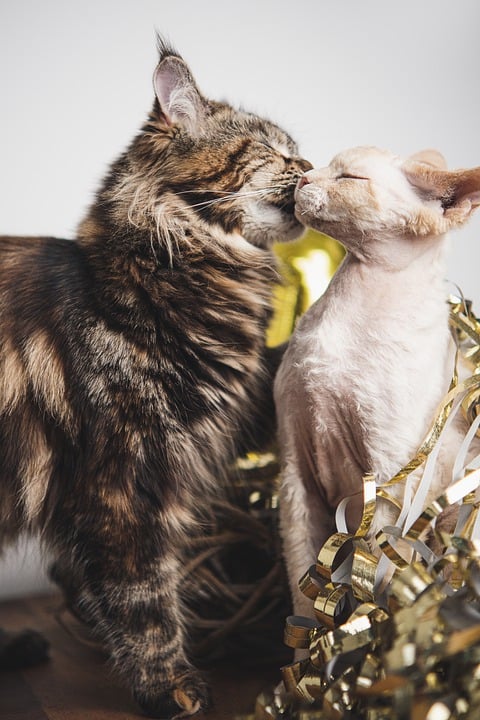Cats are known for their independent and mysterious nature, but they can also experience anxiety and fear just like humans. It is important for cat owners to recognize the signs of anxiety or fear-based behaviors in their furry friends to ensure their well-being. In this article, we will discuss the common signs of anxiety or fear in cats, as well as provide tips on how to help your cat overcome these feelings.
Understanding Anxiety and Fear in Cats
Anxiety and fear are normal emotions that all animals, including cats, experience at times. However, if these emotions become excessive and interfere with a cat’s daily life, it might indicate an underlying problem. Cats can develop anxiety or fear-based behaviors due to various reasons such as past traumatic experiences, lack of socialization, changes in environment, or medical conditions.
Signs of Anxiety or Fear-Based Behaviors in Cats
1. Excessive Hiding: Cats naturally seek out hiding spots, but if you notice your cat spending an excessive amount of time hiding or avoiding interaction, it could be a sign of anxiety or fear.
2. Aggression or Defensive Behaviors: Cats may display aggression or defensive behaviors when they feel threatened or anxious. This can include hissing, growling, swatting, or biting.
3. Excessive Grooming: Cats are known for their grooming habits, but excessive grooming, to the point of causing hair loss or skin irritation, can be a sign of anxiety or stress.
4. Urinating or Defecating Outside the Litter Box: If your cat suddenly starts eliminating outside the litter box, it could be a sign of anxiety or fear. Cats may avoid using their litter box if they associate it with a negative experience.
5. Excessive Vocalization: Cats may meow excessively when they feel anxious or fearful. This could include loud, distressed meows or constant vocalization throughout the day.
6. Destructive Behavior: Cats may resort to destructive behaviors, such as scratching furniture or chewing on objects, as a way to cope with anxiety or fear.
Tips for Helping Your Cat Overcome Anxiety or Fear
1. Create a Safe Environment: Provide your cat with a safe and secure environment by offering hiding spots, comfortable bedding, and vertical spaces like cat trees or shelves. This allows your cat to feel in control and reduce anxiety.
2. Positive Reinforcement: Use positive reinforcement techniques to help your cat associate positive experiences with situations that trigger anxiety or fear. Reward your cat with treats, praise, or playtime when they exhibit calm behavior.
3. Slow and Gentle Socialization: If your cat is fearful of certain situations or people, gradually introduce them in a controlled and gentle manner. Allow your cat to approach at their own pace and reward them for calm behavior.
4. Provide Mental Stimulation: Engage your cat in interactive play and provide puzzle toys or treat-dispensing toys to keep their minds occupied. Mental stimulation can help alleviate anxiety and redirect their focus.
5. Consult with a Veterinarian: If your cat’s anxiety or fear-based behaviors persist or worsen despite your efforts, it is important to consult with a veterinarian. They can rule out any underlying medical conditions and provide guidance on behavior modification techniques or medication if necessary.
FAQs
Q: Can cats develop anxiety or fear-based behaviors as they age?
A: Yes, cats can develop anxiety or fear-based behaviors at any age. However, older cats may be more susceptible to these behaviors due to age-related changes or medical conditions.
Q: Can I use medication to treat my cat’s anxiety?
A: In some cases, medication prescribed by a veterinarian may be necessary to help manage a cat’s anxiety. However, medication should always be used under professional guidance and in conjunction with behavior modification techniques.
Q: How long does it take for a cat to overcome anxiety or fear?
A: The time it takes for a cat to overcome anxiety or fear varies depending on the individual cat and the severity of their condition. Some cats may show improvement within weeks, while others may require longer periods of time and ongoing management.
Q: Can I use essential oils to calm my anxious cat?
A: It is important to exercise caution when using essential oils around cats, as some oils can be toxic to them. Consult with a veterinarian before using any essential oils to ensure they are safe for your cat.
Remember, recognizing signs of anxiety or fear-based behaviors in your cat is the first step towards helping them lead a happier and healthier life. By providing a safe environment, positive reinforcement, and seeking professional guidance when needed, you can support your cat in overcoming anxiety or fear.








